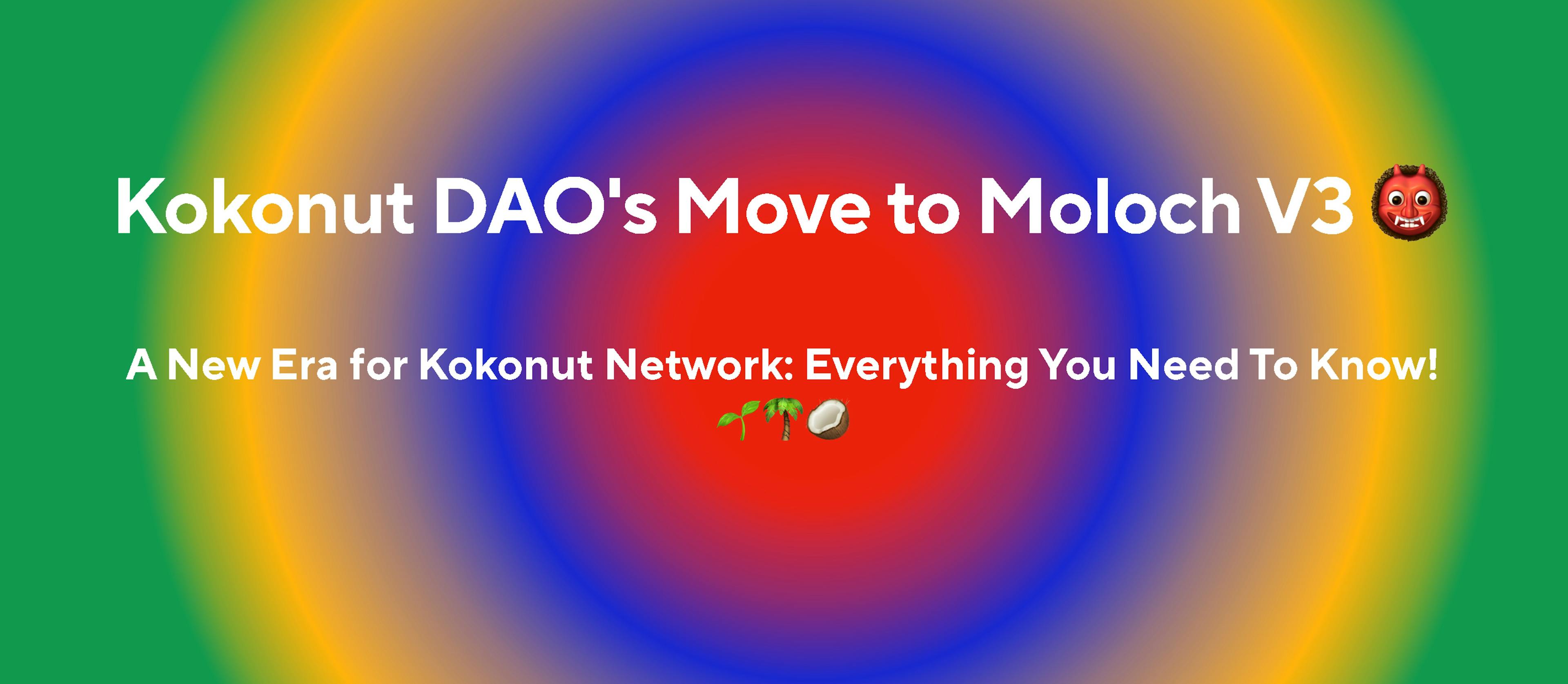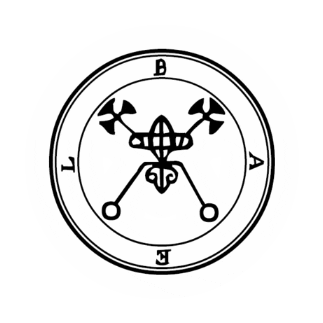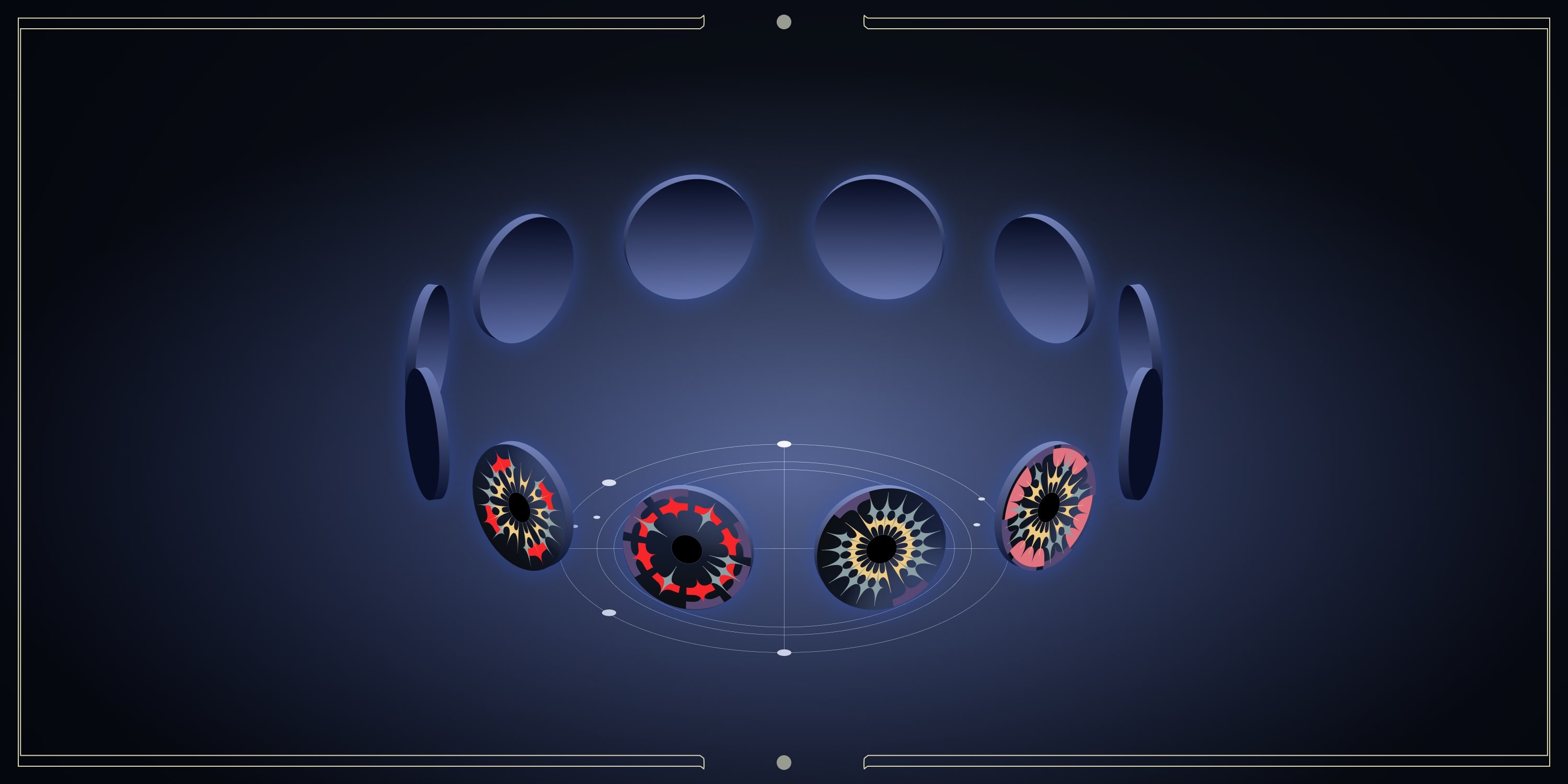
Kokonut DAO's Move to Moloch V3 👹
A New Era for Kokonut Network: Everything You Need To Know!
In our journey at Kokonut Network, we've always been early adopters, seeking innovative solutions in the ever-evolving Web3 landscape.
Since December 2021, we've relied on DAOHaus V2 to facilitate our governance and decision-making processes. In this blog post, we'll not only explore the exciting new features that DAOHaus V3 brings to the table, but also provide insight into the strategic reasoning behind our decision to make this significant upgrade.
This upgrade empowers Kokonut Network with more flexibility, customization, and scalability. It's about aligning our principles of community-first, freedom of work, and freedom of access with cutting-edge technology.
Our DAO is not just about planting coconuts; it's about shaping the future of decentralized communities.
Join us in this exciting new era as we explore the endless possibilities of DAOhaus V3.
What is the Moloch Framework?
Why Choose DAOHaus V3?
New Features
Ragequit
Gnosis Safe Integration
Token Upgradability and Ownership
Token Interfaces
Moloch Framework is a term that refers to a set of smart contracts that make decentralized autonomous organizations (DAOs) work. These contracts are like the rules and systems that govern how a DAO operates. It's kind of like the operating system for a DAO.
In a Moloch DAO, membership is a big deal. You can't just join one; you need an existing member to invite you and vouch for you by sponsoring and voting on a membership proposal. Membership is tracked using shares and loot. Shares give you voting power, meaning you have a say in the decisions the DAO makes. Loot represents a claim to the DAO's money, but it doesn't give you voting power.
Moloch DAOs have many security features. For example, they can turn off the ability to transfer shares or loot, which helps prevent people or bots from buying or trading them like assets. This is a security measure to protect the DAO.
One more thing, Moloch Framework is open-source, which means the code that makes it work is freely available for anyone to use. This makes it more secure, user-friendly, and adaptable to the needs of different communities.



DAOHaus V3 represents a significant leap in DAO management and governance. With a plethora of new features and enhanced flexibility, it provides tailored solutions for a wide range of decentralized organizations.
Here's why DAOs, including Kokonut Network, are choosing DAOHaus V3:
Treasury Management: DAOHaus V3 offers robust treasury management capabilities, allowing organizations to co-manage and disburse funds efficiently.
Versatile Governance: Share-based voting and flexible proposal execution empower DAOs to make a variety of decisions, from managing assets to membership-related matters.
Member Protections: The introduction of grace periods and the “Ragequit” functionality ensures that individual members have options to protect their investments and exit gracefully when disagreements arise.
Community Development: DAOHaus is community-owned and operated, fostering active participation in the ecosystem's growth and development.
Growth and Decentralization: DAO contributors will benefit from a range of new features aimed at improving growth and decentralization.
These updates will make it easier for contributors to get involved in the DAO and contribute to its success.
This feature gives members more precise control over how much they own within the DAO. It's like owning a part of something rather than the whole. For instance, you can own a fraction of a Coconut Tree. This flexibility makes it easier to get involved with Kokonut DAO, as you don't need to own entire Kokonut Shares to participate.
Both shares, representing economic and voting rights, and loot, representing economic rights, have transitioned into ERC-20 tokens. This transition ensures complete compatibility and composability with other ERC-20-based applications and protocols.
Furthermore, DAOs gain the capability to independently toggle the transferability of shares and loot, providing them with enhanced flexibility in managing their governance and economic assets.
Voting =
Kokonut Shares🧬 Contract 0xc6B075AC3234a7ac729114b27370B552FA284690Non-Voting =
Kokonut Loot🧬 Contract 0x2508a11aee11ad545bae87cd42131c04613b2099
DAOHaus V3 extends its support for vote delegation and signatures, similar to the functionality seen in the Compound Governor system. Members can delegate their voting power to others, enhancing scalability while retaining a robust governance ecosystem.

In V3, the concept of shamans is introduced, which are external contracts that DAOs can endorse for specific permissions. Manager shamans gain the ability to mint and burn shares and loot without relying on a DAO proposal, enabling trustless onboarding.
Additionally, governor shamans can make adjustments to governance parameters without necessitating a DAO proposal, streamlining the decision-making process.
In V3, DAOs gain the ability to adjust all governance parameters through proposals, offering a high degree of control over essential settings. This flexibility extends to governor shamans if appointed by the DAO, ensuring adaptability to evolving circumstances and the optimization of governance structures.

"New Offering" feature is designed to prevent unnecessary or spammy proposals. It works by requiring individuals to pay a fee in the form of the DAO's native asset, which is then added to the DAO's treasury. This helps filter out proposals that may not be serious or valuable to the organization.
"Quorum" refers to the minimum percentage of members' voting power needed to approve a proposal so that it can become a real action or decision. This quorum percentage plays a crucial role in how a DAO functions. Initially, after the DAO is created, this percentage is set, but it can later be changed through a proposal made by the DAO members. It's an important parameter that impacts how easily decisions are made within the DAO.
"Minimum Retention %" represents the highest percentage of DAO members, including those with voting and non-voting stakes, that must continue to be part of the DAO after a grace period. If the number of members drops below this percentage, the proposed action or decision is not carried out. It's a way to ensure that a certain level of member participation is maintained for proposals to take effect.
"Sponsor threshold" is the minimum number of voting stake tokens that a member must possess in order to support or endorse a proposal. This rule ensures that only members with a certain level of influence in the organization can propose or back specific ideas or decisions.
In V3, Moloch DAOs benefit from the capability of executing arbitrary actions within proposals. This eliminates the need for funds to be transferred into a Minion for specific actions, streamlining governance processes and enhancing efficiency. Furthermore, proposals in V3 are multi-send compatible, enabling the bundling of multiple actions into a single proposal for added convenience and simplicity.

Only those communities who are willing to be held accountable for their actions are brave enough to implement ragequit. Don’t disappoint us. Moloch V3 Docs.
Ragequit, the distinctive feature of Moloch DAOs, introduces advanced capabilities. Share and loot holders gain the freedom to select the tokens they receive during a Ragequit, eliminating the prerequisite of token whitelisting. This enhancement not only elevates the user experience but also amplifies the versatility of Moloch DAOs.
Ragequit in DAOs refers to a member leaving a DAO, typically due to frustration or disagreement. This exit option is essential because it allows members to withdraw their share of the assets before a proposal is enacted, even if the majority approves it. It's like a safety valve, ensuring that members have a say and can protect their interests.
The 'right to exit' in DAOs is crucial. It should be clearly defined in the DAO's rules and embedded in its core technology. Members should have the freedom to leave the DAO whenever they wish, without facing penalties. This process should be straightforward and efficient.

In Moloch DAOs, ragequit is a valuable feature. It lets members exit and take their portion of the funds with them. This prevents members from feeling trapped and encourages collaboration. It's a powerful incentive for members to stay and work together to avoid someone resorting to ragequit.
Moloch DAOs can seamlessly utilize a Gnosis Safe as their treasury, leveraging the Zodiac Standard for enhanced functionality. This integration caters to a diverse array of on-chain assets, encompassing ERC-20 tokens, ERC-721, ERC-1155, veTokens, native coins, and beyond. Notably, it simplifies the transition from multisig wallets to DAOs and fosters effortless migration between various DAO frameworks, all without the necessity of funds relocation.
Kokonut DAO
Treasury Contract: 0xeb55b75328a8dffd45bbf34b7e7efc431a179085Kokonut DAO
Treasury Safe: gno:0xeB55b75328a8dFfd45Bbf34B7e7efC431A179085
In V3, both loot and shares tokens have evolved into upgradable ERC-20s. This upgrade empowers DAOs with the ability to propose token upgrades or ownership changes, thereby enhancing their flexibility and adaptability for evolving governance strategies.
DAOs often interact with different types of tokens and technologies. These interactions are essential for their functioning.
Here are some of the interfaces and technologies that DAOs, like Baal, may use:
1. ERC-20: This is a common standard for tokens on the Ethereum blockchain. Baal uses it for shares and loot, which are like digital assets that DAO members hold. These tokens can be paused, making them temporarily unusable if needed.
2. EIP-2612: Baal's shares also support something called EIP-712-style approvals. This feature allows for more efficient and secure transactions. It means you can do things like paying transaction fees in tokens (including Baal shares) instead of the native cryptocurrency, ETH.
3. EIP-1167: This is about something called a “Minimal Proxy Contract.” It's a way to create new contracts with minimal overhead. Think of it as a template for creating other contracts.
4. Gnosis Zodiac: This is a set of tools and principles that help DAOs work together more easily. It's like a common language that different DAOs can use to understand each other and work together smoothly.
DAOHaus V3 represents a monumental leap in the realm of decentralized autonomous organizations. With its features and adaptability, it empowers DAOs to function more efficiently and effectively than ever before.
Kokonut Network is thrilled to be at the forefront of this technological advancement, and we eagerly anticipate harnessing its potential to advance our mission of fostering sustainable agriculture and community-driven solutions.
Made with 💚 by AI & Humans, crafted with a neutral tone for non-tech audiences.
As Seen On database for past events.
Kokonut Network AMA & Workshop @ Huddle, 26 September 2023 at 11:00 AM EST
Kokonut Framework Showcase @ Discord, October 10, 2023 11:00 AM—1:00 PM EST
Check our Web Calendar or 1-click add our Public Events to your favorite Calendar App.







Wrote this 1 year ago today. One of my fav pieces about Kokonut DAO and how it works when it comes to governance & ownership. We had 0 farms in operations back when this blog post went live, and today we have 3 farms and working the roadmap for Kokonut Venus 🌱 Motivated to write a new one about how Kokonut DAO been capturing value in the past 12 months, even tho last DAO Treasury transaction was December 2022. https://paragraph.xyz/@kokonut/kokonut-dao-molochv3
Great work man! 121 $degen 800 $wild I’d like for you to brief some frens on @kokonutnetwork Can u join us for a call 9/20 11:45am EST? @giulietta @altosix @alfredodc @blueicons @esparzacarvajal @mfmplus2024
Thank you hermano. Yes i can join the call 🫡
I'm supporting you through /microsub! 58 $DEGEN (Please mute the keyword "ms!t" if you prefer not to see these casts.)
I'm supporting you through /microsub! 60 $DEGEN (Please mute the keyword "ms!t" if you prefer not to see these casts.)
I'm supporting you through /microsub! 64 $DEGEN (Please mute the keyword "ms!t" if you prefer not to see these casts.)
I'm supporting you through /microsub! 58 $DEGEN (Please mute the keyword "ms!t" if you prefer not to see these casts.)
I'm supporting you through /microsub! 57 $DEGEN (Please mute the keyword "ms!t" if you prefer not to see these casts.)
I'm supporting you through /microsub! 58 $DEGEN (Please mute the keyword "ms!t" if you prefer not to see these casts.)
Kokonut DAO's Move to Moloch V3 👹 @paragraph